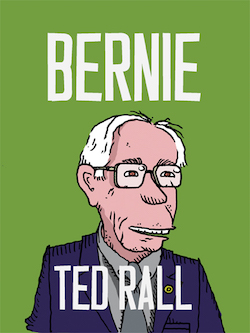Thursday Comics Hangover: Bernie Sanders, comic book hero
Last year, cartoonist Ted Rall visited Seattle with Snowden, a comic book biography of Edward Snowden. (I reviewed Snowden and interviewed Rall onstage at Town Hall.) Only a half-year later, Rall’s back, and reading at Town Hall tonight from his brand-new Bernie Sanders biography, Bernie.

Bernie opens with a long, substantial explanation of how the Democratic party leaned to the right in response to George McGovern’s crushing defeat at the hands of Richard Nixon. Rall argues that the party has drifted steadily rightward ever since. (I would counter-argue that Barack Obama is a decidedly more liberal president than Bill Clinton, but I freely admit that this criticism might fall along partisan, rather than aesthetic, lines; in any event, Rall makes a convincing case and supports it with plenty of evidence.)
Ultimately, Bernie isn’t as good a book as Snowden was. It feels rushed, and the many pages depicting a cartoon Sanders speaking are less visually interesting than the explanatory illustrations of Snowden. Too much of the book is spent on a straight-up biography of Sanders, describing his first, failed marriage and his many runs for office. Perhaps it sounds odd to criticize a biography for being too focused on biographical details, but in a presidential year it seems as though it would be more useful to examine Sanders’s policies in more detail, to explain why they’re not too far removed from the global mainstream. Rall mentions many of the policies in passing — single-payer health care most particularly — but a thorough description of them would do wonders to normalize Sanders for a more skeptical audience.
Rall does try to provide a warts-and-all portrait of Sanders, mentioning his occasional support for NRA-approved pro-gun laws and his support for President Obama's drone assassination program. He also brings up, but doesn’t fully address, two very important criticisms of the Sanders campaign: the belief that Sanders couldn’t win the presidency and the corresponding belief that even if he were to become president, he would be unable to break Congressional gridlock to achieve his lofty goals.
But Bernie is worth your time and attention if you’re looking for an explanation of how a decent man decides to run for president. It documents a long, honorable life of civic service and the ideological battle that is right now at the heart of the Democratic Party. When sharing a bookshelf with Snowden, the two books make up a duology of honor and responsibility and citizenship. In a presidential election year, this might be exactly what the American people need to read.